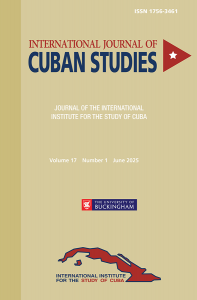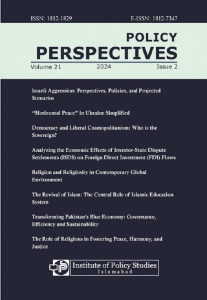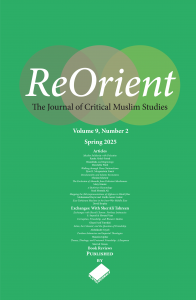New Perspectives from Cuba, Pakistan & Critical Muslim Studies
It’s August! Our summer reading includes thought-provoking perspectives from Cuba, Pakistan, and Critical Muslim Studies.
All of our journals are Diamond Open Access and all articles are free to read. You can see our whole collection and the archive on ScienceOpen and JSTOR.
 In the latest issue of International Journal of Cuba Studies, Volume 17, Issue 1, Eloise Linger’s article, “Three Views of Revolutionary Power in Cuba’s Countryside, 1957–1958”, moves from the first-hand account of a 26 July Movement “auditor” who established alternative governance in rural areas by providing education, healthcare and rudimentary justice, to historical research that reveals the crucial role of Black radical coffee growers and Communist Party organising in eastern Cuba. Ernesto Domínguez López, Ariadna Cornelio Hitchman, and Seida Barrera Rodríguez’s article “The Activation of the Title III of the Helms-Burton Act: The Making of a Policy”, analyses the early implementation of this part of the Act which enables lawsuits against companies operating with expropriated property in Cuba. Frans Lavdari and Xhulio Lavdari investigate “The Russo-Ukrainian War: Political and Trade Implication for American Neighbourhoods”, and how it has influenced Cuba’s political and trade relations with the United States, Canada, and Mexico.
In the latest issue of International Journal of Cuba Studies, Volume 17, Issue 1, Eloise Linger’s article, “Three Views of Revolutionary Power in Cuba’s Countryside, 1957–1958”, moves from the first-hand account of a 26 July Movement “auditor” who established alternative governance in rural areas by providing education, healthcare and rudimentary justice, to historical research that reveals the crucial role of Black radical coffee growers and Communist Party organising in eastern Cuba. Ernesto Domínguez López, Ariadna Cornelio Hitchman, and Seida Barrera Rodríguez’s article “The Activation of the Title III of the Helms-Burton Act: The Making of a Policy”, analyses the early implementation of this part of the Act which enables lawsuits against companies operating with expropriated property in Cuba. Frans Lavdari and Xhulio Lavdari investigate “The Russo-Ukrainian War: Political and Trade Implication for American Neighbourhoods”, and how it has influenced Cuba’s political and trade relations with the United States, Canada, and Mexico.
In “Hilary Spicer: A Bridge of Love between Canada and Cuba”, Cardoso Rodríguez, Camacho Delgado and Moré Rojas examine Spicer’s role in fostering cross-cultural understanding and promoting bilateral exchanges. Her career demonstrates how grassroots initiatives can reshape bilateral relations and promote global solidarity.
The final article, by Mercedes de los Ángeles Rodríguez and Josefina Domínguez-Mujica, examines “Cuban women in the Canary Islands (Spain): Coping with Deskilling and Reinventing Transnational Reproductive Practices”.
 In the latest Policy Perspectives is the flagship journal of Institute of Policy Studies (IPS), Islamabad. Volume 22, Issue 1, opens with an article employing the prisoner’s dilemma framework. Nora Maher’s paper “Mending Fences in the GCC-Iran Relationship in the Wake of Israel-Gaza War” examines how hard-line Gulf states could shift from a punitive stance toward Iran to a collaborative approach, encouraging cooperation over confrontation. In “Israel-Gaza War : Geopolitics and the Game Theory”, Aneela Shahzad evaluates the protracted Israel-Palestine conflict through the lens of game theory, and seeks to lay down the field of play, identify players, discover different angles from which to approach the matter, and bring the reader closer to possible solutions.
In the latest Policy Perspectives is the flagship journal of Institute of Policy Studies (IPS), Islamabad. Volume 22, Issue 1, opens with an article employing the prisoner’s dilemma framework. Nora Maher’s paper “Mending Fences in the GCC-Iran Relationship in the Wake of Israel-Gaza War” examines how hard-line Gulf states could shift from a punitive stance toward Iran to a collaborative approach, encouraging cooperation over confrontation. In “Israel-Gaza War : Geopolitics and the Game Theory”, Aneela Shahzad evaluates the protracted Israel-Palestine conflict through the lens of game theory, and seeks to lay down the field of play, identify players, discover different angles from which to approach the matter, and bring the reader closer to possible solutions.
In “Trump’s Five Percent NATO Ruse”, Lars Hilse argues that President Trump’s demand strategically advances American business interests, as the European nations currently allocate approximately 63 percent of their military procurement budgets to US defence firms. Abid Hassan and Syed Hammad Ali’s paper “Evolving US Indo-Pacific Posture and Strategic Competition with China”, analyses the political, economic and military ramifications of the US Indo-Pacific policy for China including regional alliances, trade and investments, arms race, maritime security, tariffs and duties under the Trump 2.0 administration.
In “From Ganga to Pahalgam : India’s Arc of Strategic Deceit”, Asifa Tanveer explores the history and use of false flag operations to contextualise India’s pattern of blame provenance in the wake of the Pahalgam incident. It further analyses whether the Pahalgam incident and the much-hyped Indian response reflects honest concerns, or a broader political agenda, reflecting ‘method in madness’.
Khalid Rahman pays homage to Prof. Khurshid Ahmad, the founder and patron of Policy Perspectives, exploring his contributions in “The Life and Legacy of a Luminary Scholar Khurshid Ahmad [1932-2025] : A Tribute”. Finally, the “Dialogue at IPS” section features discussions of events held at the Institute of Policy Studies along with a summary of situational briefs on “Beyond the Frontlines: 50 Days Since the Pahalgam Incident”.
 The latest issue of ReOrient, Volume 9, Issue 2, begins with “Muslim Solidarity with Palestine whilst Living on Stolen Land: The politics of Ramadan in Australia”. The author, Randa Abdel-Fattah, outlines how respectability, politics and liberal multicultural agendas pursued by Muslim community leadership legitimate and reproduce settler-colonial relations of power and demonstrates how this undermines a praxis of ummah as potential clarion call to decolonial, anti-imperial struggle both here on stolen land and in solidarity with Palestinians.
The latest issue of ReOrient, Volume 9, Issue 2, begins with “Muslim Solidarity with Palestine whilst Living on Stolen Land: The politics of Ramadan in Australia”. The author, Randa Abdel-Fattah, outlines how respectability, politics and liberal multicultural agendas pursued by Muslim community leadership legitimate and reproduce settler-colonial relations of power and demonstrates how this undermines a praxis of ummah as potential clarion call to decolonial, anti-imperial struggle both here on stolen land and in solidarity with Palestinians.
Rather than attempting to show how classically influenced the Islamicate really is, Marchella Ward’s article “Bismillahs and Beginnings: Notes from the Islamicate on ReOrienting Classicism”, is an experiment aimed at finding out whether understanding the Muslim ontologically, as oppositional with Eurocentrism, might in fact be able to counter classicism and work for justice.
Ilyse R. Morgenstein Fuerst describes a shift in memory and memorialisation, the politics of such a shift, and the concept of piousness in “Walking through Pious Nationalisms: Remembering the Great Rebellion while Touring the First War of Indian Independence”.
Mariam Khawar’s paper “Decoloniality and Islamic Economics”, focuses on the epistemology of Islamic economics and argues for the need to decolonise Islamic economics by incorporating decoloniality in the philosophical discourse of the discipline. Mary Hunter examines “The Exclusion of Ahmadis from Pakistani Muslimness: Iqbal, Maududi, and the Zia Regime”.
In “A Butlerian Hauntology”, Syed Mustafa Ali engages with the backstory to Frank Herbert’s Dune saga, viz. The Butlerian Jihad, tracing its genealogy, and considering its possible relevance for thinking about and motivating an Islamicate response to artificial intelligence (AI) and cognate technologies.
In “From Kabuliwala to Kesari: Mapping the (Mis)representations of Afghans in Hindi films” Mohammad Reyaz and Kaifia Ancer Laskar conclude that Islamophobia and the larger anti-Muslim rhetoric playing out in India have contributed to the vilification of Afghans on screen even though the two countries shared cordial political relations. In “Exiles or Intermediaries? East Turkistani Muslims in the Interwar Middle East”, David Brophy examines a series of individuals from Xinjiang who were active in the region in the interwar period, with an emphasis on Cairo as a hub of intellectual exchange, and considers the relevance of their experience to the discussion of present-day Uyghur advocacy.
A series of Exchanges: With Sher Ali Tahreen
“Exchanges with SherAli Tareen: Perilous Intimacies S. Sayyid and Shvetal Vyas Pare
“Corruption, Friendship, and Women’s Bodies” Ghazal Asif Farrukhi
“Islam, the Colonial, and the Question of Friendship” Abdulkader Tayob
“Perilous Intimacies and Imperial Theologies” Humeira Iqtidar
“Theory, Theology, and Fraternal Friendship: A Response” Sher Ali Tareen
Stay up-to-date with the latest research highlights by signing up to the Pluto Journals newsletter!

